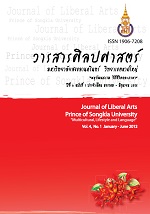Balancing structuralism and poststructuralism in EFL writing instruction and assessment
Keywords:
Structuralism, poststructuralism, instruction, EFL writing, EFL writing instruction and assessmentAbstract
Structuralists maintain that every human action, including writing a text, is governed by an underlying structure. One probably agrees with this notion when considering how English as a Foreign Language (EFL) writing is taught and learned. Much of what EFL writing teachers apply is the knowledge created by structuralists––ranging from how words are formed to how an essay is organized. However, while structuralist methodologies provide grammatical knowledge and organizational skills indispensible for good writing, they are often viewed as depriving students of their freedom to think critically, and thus to discover knowledge by and for themselves. On the other hand, poststructuralists believe that knowledge is a collage or a juxtaposition of pieces of information. For poststructuralists, differences create knowledge, which is by no means stable. Poststructuralists, therefore, suggest that we teach our students to look at a thing, a person, or a topic from all directions. By so doing, our students become more critical and knowledgeable. With the belief that education is growth both in skills and in knowledge, it is advisable that EFL writing teachers combine concepts of structuralism and poststructuralism.
Downloads
How to Cite
Issue
Section
License
The authors retain the copyright to their article but the Journal of Liberal Arts, Prince of Songkla University reserves the exclusive rights to first publication.






